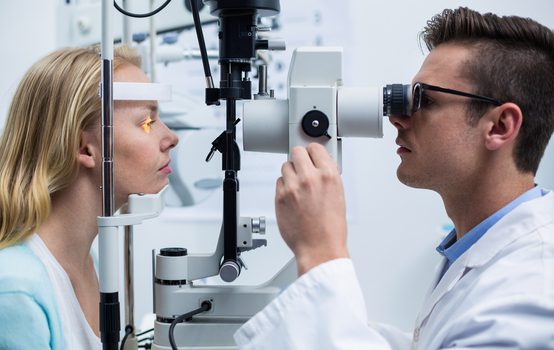Optometrists’ Cronyist Assault on Online Eye Exams

The rise of new technology often brings new opportunities and benefits to consumers, who save time, money, and everything in between as a result. But the outdated industries, such as the taxi industry in the age of Uber/Lyft, never leave without putting up a fight.
This pattern is holding true with the recent rise of ocular telemedicine, a relatively new innovation that allows consumers to use a cellphone or tablet app, in conjunction with a virtual sign-off from a board-certified ophthalmologist, to test their eyes for lens prescriptions.
The optometrists and their lobbyists want this innovation restricted simply because it threatens the profitability of their industry. In order to preserve their market share, they are going state-by-state seeking to enact legislation that will restrict consumers’ access to this technology.
I served in the Office of Policy Development under President Ronald Reagan. Reagan would’ve been quick to call this practice “regulatory capture,” and rightfully so. The optometrist assault on the free market needs to end so that consumers can receive the most convenient care at the cheapest price.
Optometrists have traditionally had patients visit annually for full eye exams, and they would often hold back consumers’ prescriptions and convince them to purchase new eyeglasses or contact lenses at inflated prices directly from their offices. This practice was quite lucrative for the eye doctors for many years, but the revenue from such sales has declined recently now that federal law requires doctors to give patients copies of their prescriptions.
This law, known as the Contact Lens Rule, facilitates the ordering of eyeglasses and contact lenses from cheaper third-party sellers by prohibiting doctors from using their prescription-writing powers for personal gain. Thanks to this legislation, more customers are now realizing that they aren’t boxed in to purchasing expensive lenses from their eye doctor, and they are now turning to alternative sellers for cheaper options.
While the Contact Lens Rule was certainly helpful in legalizing competition, ocular telemedicine is now challenging optometrists’ market share to an even greater degree. Allowing eye tests for prescriptions via cellphone apps means that patients don’t even have to set foot in the eye doctor’s office to receive a lens prescription. In fact, they can now visit their eye professional as infrequently as once every two years just to receive the eye-health exam that is not yet made possible by ocular telemedicine, rather than every single time a lens refill is needed.
This technology is leading to a further decline in revenue for these eye doctors, who are having a much more difficult time selling lenses in their shops since there are fewer bodies available to bait and switch. As a result, they and their lobbyists are seeing a legislative remedy.
Thankfully, their efforts have been far from successful. In two states, anti-ocular-telemedicine legislation has been vetoed by the governor. Then-South Carolina Gov. Nikki Haley, before her appointment by President Trump as U.N. ambassador, vetoed her state’s bill, asserting that the eye doctors’ lobby was “[using] health practice mandates to stifle competition for the benefit of a single industry.” Also this month in New Mexico, state legislators Deborah Armstrong and Sheryl Williams-Stapleton pushed through legislation to restrict consumer access to ocular telemedicine, but the state’s governor, Susana Martinez, vetoed it.
Similar legislation also failed in the Montana state senate, while in Nevada, Assemblywoman Jill Tolles withdrew her bill on the matter. But these mounting defeats are not stopping Big Eye and its allies from seeking legislation in other states to restrict the new technology.
In Connecticut, Rep. Kevin Ryan, a former optometrist, has sponsored legislation to restrict ocular telemedicine usage. Likewise, Rep. Robert Jacquard and Sen. Frank Ciccone in Rhode Island are sponsoring similar legislation. Given the issues involved, and the increasing awareness of voters that their rights as consumers are at stake, these state legislators and others should realize their error in seeking legislation to restrict consumer access to this beneficial technology.
As the public puts more pressure on politicians, we should expect to see more of these kinds of bills defeated. But those who do vote in favor of restricting consumer access to ocular telemedicine will soon find out that voters will remember in November—it’s awfully hard to forget about cronyism.
Peter Ferrara is a senior fellow at the Heartland Institute and senior policy advisor for the National Tax Limitation Foundation. He served at the White House Office of Policy Development under President Reagan, and as associate deputy attorney general of the United States under President George H.W. Bush.
Comments